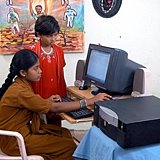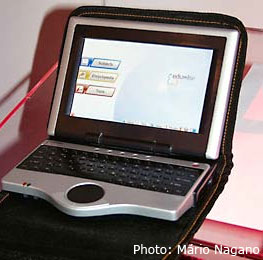Intel's Eduwise Unveiled
At the World Congress on Information Technology in Austin, Intel's Paul Otellini rolled out more details about Intel's plans for worldwide education and showed a prototype of the new, low-cost, Eduwise computer.
Speaking at the event, Otellini cited Intel founders gordon Moore and Andy Grove, explaining that Moore's law (doubling computing power every 18 months) and Grove's vision of a billion interconnected PCs worldwide are coming to fruition.

“Moore’s Law and volume economics made PC technology broadly accessible, and Andy understood the tremendous additive force of the Internet. But this power is still out of reach for most of the world’s people. The World Ahead Program, which integrates Intel’s efforts in accessibility, connectivity and education, seeks a multiplier effect to accelerate the next wave of gains.”
(Click the link to ...
Part of Intel's World Ahead program includes the Eduwise PC, which Otellini announced a month ago with a target price of $400. Today, he showed off a prototype. Specs are still sketchy, but Otellini did say that the machine will include wireless networking, collaborative tools, and will be able to run Windows or Linux operating systems.

From a press release on Intel's site:
"With students using the Eduwise notebook in class, a teacher can make presentations, control what a student has access to, and interact individually with each student in giving tests or providing feedback. The Intel-developed education application integrates with other non-computing learning tasks such as note taking and handwriting with wireless pen attachments. Because it is a fully featured PC, the Eduwise design can accommodate other standard software and tools for additional needs and uses.
Otellini also announced that Intel and the Mexican government have reached an agreement to make Intel’s new low-cost, fully featured PC available to 300,000 teachers by year’s end. The systems, unveiled last month in Mexico by Otellini as part of Intel’s Discover the PC initiative, provide an easy-to-use, fully functional PC for first-time users. Intel also plans to extend teacher training to 400,000 teachers in Mexico through the Intel Teach to the Future program by 2010."
Big plans. And while Intel's ambition is commendable, the rush to such noble goals is not without its' mercenary aspects. Intel is playing a game of catch-up, to a certain extent, with OLPC, or One Laptop Per Child, a program launched and then spun off by MIT Media Labs and headed by entrepreneur Nicholas Negroponte.
Intel's Otellini has been derisive of the OLPC concept, which aspires to $100 lower-end machines that can be powered by hand crank and which run open-source firmware and software, and operate as nodes on a mesh network platform. In his remarks today, Otellini took a thinly-veiled shot at OLPC, saying "nobody wants to cross the digital divide using yesterday's technology."
While the Intel chief's statement may be true on the surface, his rivalry with OLPC may be misplaced. In fact, the OLPC program is specifically targeting developing markets where a lack of infrastructure may prevent a higher-end machine like Intel's from crossing that digital divide. Otellini's vision depends on basic requirements such as power and established network hardware, whereas the OLPC unit assumes that infrastructure is BYON (build your own network).
Whether these rivals go mano-a-mano in developing countries, or they each find and fill their own niche in that digital divide, one thing is clear: computing for the masses is coming soon to students who are currently left out of the global information economy. That's a good thing, no matter which model(s) gain critical mass. Cool, huh?
Read the full post here ...
Speaking at the event, Otellini cited Intel founders gordon Moore and Andy Grove, explaining that Moore's law (doubling computing power every 18 months) and Grove's vision of a billion interconnected PCs worldwide are coming to fruition.

“Moore’s Law and volume economics made PC technology broadly accessible, and Andy understood the tremendous additive force of the Internet. But this power is still out of reach for most of the world’s people. The World Ahead Program, which integrates Intel’s efforts in accessibility, connectivity and education, seeks a multiplier effect to accelerate the next wave of gains.”
(Click the link to ...
Part of Intel's World Ahead program includes the Eduwise PC, which Otellini announced a month ago with a target price of $400. Today, he showed off a prototype. Specs are still sketchy, but Otellini did say that the machine will include wireless networking, collaborative tools, and will be able to run Windows or Linux operating systems.

From a press release on Intel's site:
"With students using the Eduwise notebook in class, a teacher can make presentations, control what a student has access to, and interact individually with each student in giving tests or providing feedback. The Intel-developed education application integrates with other non-computing learning tasks such as note taking and handwriting with wireless pen attachments. Because it is a fully featured PC, the Eduwise design can accommodate other standard software and tools for additional needs and uses.
Otellini also announced that Intel and the Mexican government have reached an agreement to make Intel’s new low-cost, fully featured PC available to 300,000 teachers by year’s end. The systems, unveiled last month in Mexico by Otellini as part of Intel’s Discover the PC initiative, provide an easy-to-use, fully functional PC for first-time users. Intel also plans to extend teacher training to 400,000 teachers in Mexico through the Intel Teach to the Future program by 2010."
Big plans. And while Intel's ambition is commendable, the rush to such noble goals is not without its' mercenary aspects. Intel is playing a game of catch-up, to a certain extent, with OLPC, or One Laptop Per Child, a program launched and then spun off by MIT Media Labs and headed by entrepreneur Nicholas Negroponte.
Intel's Otellini has been derisive of the OLPC concept, which aspires to $100 lower-end machines that can be powered by hand crank and which run open-source firmware and software, and operate as nodes on a mesh network platform. In his remarks today, Otellini took a thinly-veiled shot at OLPC, saying "nobody wants to cross the digital divide using yesterday's technology."
While the Intel chief's statement may be true on the surface, his rivalry with OLPC may be misplaced. In fact, the OLPC program is specifically targeting developing markets where a lack of infrastructure may prevent a higher-end machine like Intel's from crossing that digital divide. Otellini's vision depends on basic requirements such as power and established network hardware, whereas the OLPC unit assumes that infrastructure is BYON (build your own network).
Whether these rivals go mano-a-mano in developing countries, or they each find and fill their own niche in that digital divide, one thing is clear: computing for the masses is coming soon to students who are currently left out of the global information economy. That's a good thing, no matter which model(s) gain critical mass. Cool, huh?
Read the full post here ...






